Coaches bartering jersey colors for a regionally ranked defender. Private Facebook groups created in hopes of getting video footage of another team’s competition routine. Families being told that if they cannot commit the entirety of their schedule for four months to the team, their athlete will be removed from the program.
This is not college athletics. This is the new reality of town youth sports in Greater Boston. A decade ago, our once-beloved community sports leagues were a place where kids had the opportunity to try a new sport in a low-pressure environment. Now, many towns are seeing what looks suspiciously like the elite and competitive club sports teams previously reserved for exceptionally talented athletes.
The new rule of youth sports seems to be that if you aren’t playing to win — or don’t have the talent to do so — don’t bother playing.
Club sports have their place, and the children with the talent and dedication to participate at that level should have that opportunity. But town youth sports are not club sports. They were conceived as recreational — aka fun — programs designed to increase physical activity and teach kids the basic rules and sportsmanship of a game. Yet many organizations are actively trying to run their programs at an elite level. The cost, in every sense of the word, is nothing short of staggering.
The financial expense and time commitment of turning town teams into club-level athletics is mind blowing for parents entering the sports scene. Long gone are the days when youth sports were a once-a-week, $75-a-season endeavor. It’s now commonplace to see town sports requiring four or five days a week starting as early as first grade. Registration fees are commonly in the hundreds — especially when you tack on travel, equipment, and the “optional” (in name only) SWAG.
The financial cost is just the start of the stress these new elite town teams have created for parents. When town sports were just one night a week, you could easily bring one child to soccer practice on Tuesday and another to baseball on Wednesday. Now, with multi-night commitments for each sport, parents are forced to spend their evenings rushing from one practice to another or coordinating intricate carpool schedules. The family calendar is filled with conflicting practices, overlapping games, and the dread of needing to choose which child’s game you’ll attend.
These high-pressure sports experiences are not helping kids become more highly skilled athletes, either. Instead, this is driving kids off the fields. I have friends with children as young as 10 who have told their parents they can’t try a new sport because they’re “too old.” Apparently double digits is now the social cutoff for trying something new. These children have seen firsthand that town sports are no longer a low-pressure environment to try something new and have the freedom to be bad at it. By striving to make these programs “better,” we’ve made the average kid feel worse.
Sports provide life lessons for our children they can’t get anywhere else. Through sports, kids learn to win and lose graciously. They’re pushed out of their comfort zones. They learn to work with a team, with players both better and worse than themselves. These are lessons that will help them on and off the field. I am not an advocate for “everybody gets a trophy,” but I am an advocate for “everybody gets a chance.” A 10-year-old should not feel aged out of trying a new sport on a town rec team because they haven’t been getting private instruction since kindergarten.
What if we all just agreed to stop? To leave the high-pressure, win-at-all-costs antics to the club teams? To let town sports be — gasp! — bad, and have that be OK? It’s not likely, but it is possible. If parents who want to see change in their town programs volunteer, they can influence the trajectory from the inside. Speak up if you don’t like the way your town program is being run. Join the board if you feel you can affect positive change.
But whatever we do as parents, we should all be fighting to keep our town youth sports fun for all children, regardless of any one player’s skill level. Cheer for the kid who strikes out every time. The one who decides to go for the ball when they are usually doing cartwheels mid-field. They’re getting outside of their comfort zone, trying something new. And that should be celebrated as much as scoring a goal or hitting a home run.
We’d love to hear about towns and programs that are doing youth sports WELL. Is your child on a community youth sports team in Greater Boston that you love? Leave a comment and shout out the volunteers creating an incredible experience for your child.
















